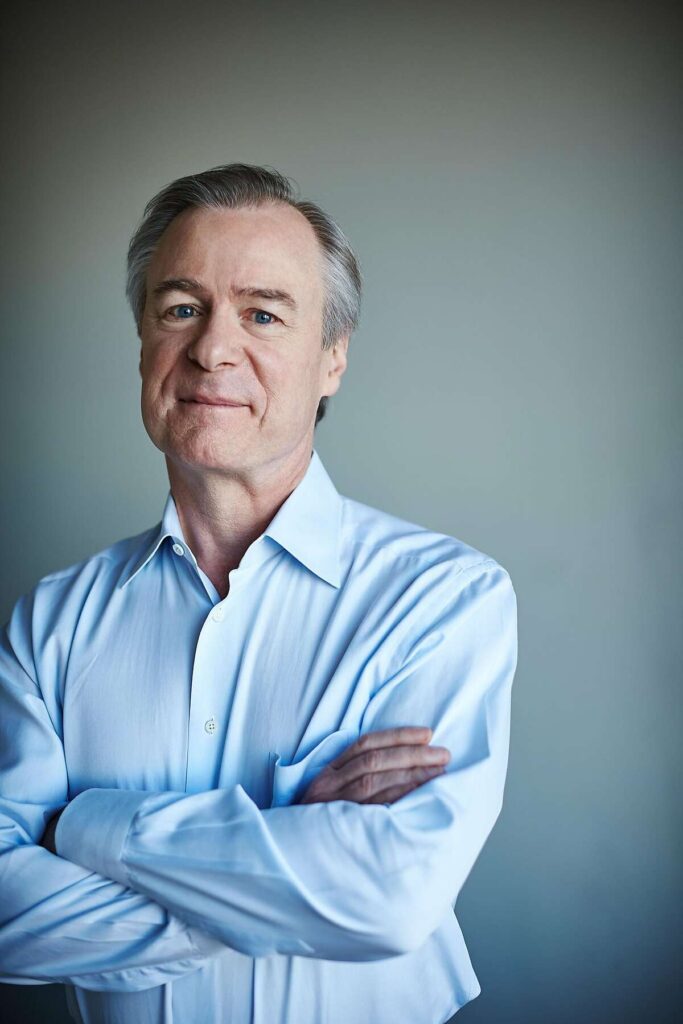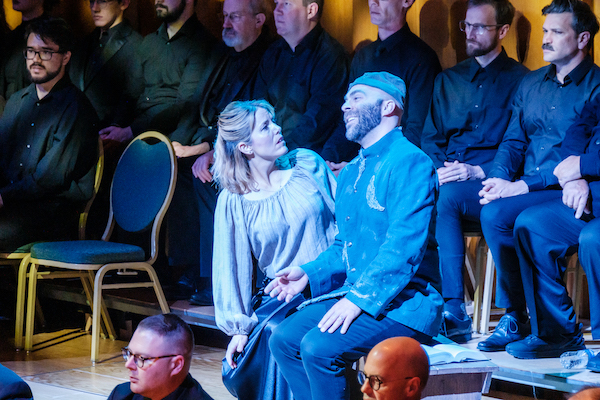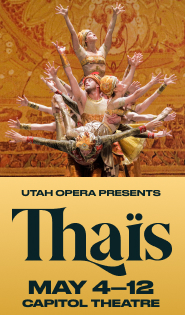Riveting Berg sets the scene for Utah Symphony’s fresh-look Beethoven Ninth

The Utah Symphony’s current season hasn’t exactly been about taking risks—until this weekend.
David Robertson opened his three-year stint in the newly created post of Utah Symphony creative partner with an evening of the three B’s: Bruckner, Berg, and Beethoven.
As the conductor stepped onto the dimly lit Abravanel Hall stage Friday night, supertitles shared commentary on the human condition by the likes of Immanuel Kant and Michel de Montaigne before informing concertgoers that they were about to experience a full range of emotions, from deep despair to victorious joy.
What followed was one of the most adventurous Utah Symphony programs since former music director Thierry Fischer’s polarized audiences by featuring Olivier Messiaen’s Des canyons aux étoiles over the course of a season.
The top-billed Beethoven Symphony No. 9, no doubt, was responsible for filling the seats in Abravanel Hall. But Robertson’s interpretation was nearly as surprising as his choice to pair Beethoven with Alban Berg.
The string forces were smaller than traditional local custom and the conductor’s brisk, lean approach revealed a wealth of detail—tantalizing snippets in the winds or strings that seemed to pop up out of nowhere. There were moments, such as in the slow movement, when the effect was a little disorienting; a fuller string sound would have been welcome there.
But Robertson, conducting from memory, delivered thrills in the first movement and the scherzo, not just in the way he exposed the music’s inner workings, but also in the invigorating surges of sound he sculpted.
The symphony’s finale proved another thrill ride. Under newly appointed chorus master Sharon Bjorndal Lavery, the Utah Symphony Chorus sang with a more heterogeneous, operatic sound and an energy that often seemed barely contained. The looming, but never realized, sense that things could erupt into chaos at any moment only added to the excitement. And the chorus’s big entrance midway through the movement was electrifying.
It’s worth noting that the singers sang from memory, giving their delivery of Schiller’s words heightened immediacy. Soloists Celena Shafer, Deborah Nansteel, Chad Shelton, and Zachary Nelson also went full tilt—especially impressive considering that they had sung Act III from Berg’s Wozzeck before intermission.
And even though Beethoven got top billing, it was the evening’s smartly programmed first half that truly impressed. With a bare minimum of lighting effects and no explanation beyond the opening titles that recapped the real-life case that inspired playwright Georg Büchner and later Berg, the chorus opened with Bruckner’s motet Christus factus est. If the words “Anton Bruckner” make you think of evening-length blocks of musical granite, this intimate devotional work—sensitively sung by the unaccompanied chorus—was a revelation.
As the motet came to a close, Shafer walked in from the back of the stage, picked up a Bible, and prepared to sing the role of the ill-fated Marie, marking a seamless transition to Berg’s lurid tale of insanity and intimate-partner violence. Shafer’s diamond-like vocal delivery and expressive physicality both read well from her position behind the orchestra. In the title role, Nelson sang with menacing power and gave an unsettlingly convincing portrayal of madness.
Nansteel and Shelton gave vivid characterizations in their brief appearances as Margret and the Captain, as did Utah Opera favorite (and the company’s new education manager) Kevin Nakatani as the Doctor. Mostly absent was the shrill edge that generally characterizes the sprechtstimme style of singing. Choristers from the Madeleine Choir School, prepared by Melanie Malinka, wrapped up the sad tale with their usual professionalism.
But it was the Utah Symphony that really shone here—perhaps partly because the lack of context lowered the stakes of the vocal drama, but mostly because of the orchestra’s masterful playing. From growling double basses to spooky percussion to the creepily out-of-tune offstage piano, the musicians brought the story to life.
Don’t let the “atonal” label scare you off; in its rich textures and haunting evocation of mood, the orchestra delivered some first-rate musicianship.
The program will be repeated 7:30 p.m. Saturday. utahsymphony.org


